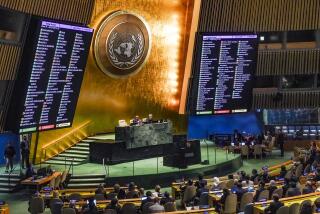Oil Embargo Against Serbia Pushed at U.N.
- Share via
UNITED NATIONS — The United States and three West European allies reached agreement Thursday on a stiff, punitive Security Council resolution that would impose an immediate oil embargo on Serbia.
Although Russia and China evidently have some reservations, most analysts expect the resolution to win final approval from the 15-member Security Council within the next few days.
The tough U.N. stance would represent a diplomatic victory for the United States, which refused to give in to pressure from Europeans to move against the Serbs by stages. The Europeans had proposed milder sanctions that would automatically intensify if the Serbs continued to defy U.N. demands that they halt their aggression in Bosnia-Herzegovina.
According to an American diplomat, the draft resolution was worked out in all-day meetings between U.S. Ambassador Edward Perkins and the ambassadors of Britain, France and Belgium, the three West European members of the Security Council.
In its most threatening provision, the resolution would impose a mandatory embargo on most trade with Serbia, including a prohibition on the sale of oil. The diplomat said the resolution also would call for a halt in flights to and from Serbia, a boycott of Serbian cultural and sports activities and a reduction in the numbers of Serbian diplomats allowed to serve abroad.
An ambassador who saw a copy of the draft resolution said it would also evict Serbia from the Yugoslav seat at the United Nations, the Associated Press reported.
The resolution would be authorized under Chapter 7, used by the Security Council to approve the war to drive Iraq out of Kuwait.
Until Wednesday, when Serbs mounted a bloody mortar attack on civilians waiting in line for bread in Sarajevo, the Bosnian capital, the Bush Administration appeared ready to go along with the European idea of a gradual series of sanctions.
But the televised pictures of the carnage--the initial report was 20 killed, later scaled down to 16--provoked enough anger to both harden the American position and dissuade the Europeans from insisting on milder action.
It is understood that Russia is wary of the sanctions both because it is planning to trade oil to Serbia in a barter deal and because it is troubled by the prospect of tough U.N. action in what many see as an internal conflict. Nevertheless, no one expects Russia to veto the resolution.
The five permanent members of the Security Council--the United States, Britain, France, China and Russia--have veto power.
While the Chinese have consistently voiced their distaste for U.N. sanctions, they have always abstained on sanctions resolutions rather than exercising their veto.
Wire services also reported that:
* Serbian irregular forces fired surface-to-surface missiles at Sarajevo on Thursday, Sarajevo Radio said in an unconfirmed report. Such an attack would be a serious escalation of ethnic fighting.
* The Serbian Orthodox Church denounced Serbia’s government Thursday. The unprecedented criticism was one of the most serious challenges to President Slobodan Milosevic since Yugoslavia began breaking up a year ago. Most of Serbia’s 9.5 million people belong to the church, which has been an ally of Serbian leaders for centuries.
* Several people were shot when Bosnian forces attacked a convoy of Yugoslav army trucks in the capital late Wednesday. The attackers reportedly captured a handful of trucks full of weapons and other equipment.
More to Read
Sign up for Essential California
The most important California stories and recommendations in your inbox every morning.
You may occasionally receive promotional content from the Los Angeles Times.












